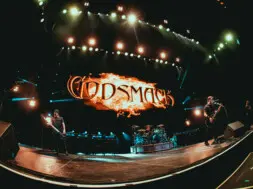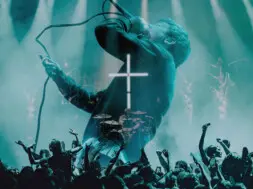
“Going back to our roots” and “stripping back our sound” are common claims for established bands to make, often a decidedly calculated attempt to placate fanbases who inevitably prefer older material to the more recent (either as a genuine response to decline in album quality or to show how “dedicated” a fan one is. Quite why anybody expected a Muse album that went “back to their roots” to not be gloriously overblown and bonkers is anybody’s guess, as this is a group who have across their entire career revelled in the ridiculous. ‘Showbiz’ only seems in any sense understated now because its successors have been even more over the top – in any other discography its doomsday pianos, extended songs lengths and Radiohead on steroids atmospheres would make it stand out as an ambitious set. Those who wanted Muse to return to that sound will be disappointed by seventh opus ‘Drones’, as (partly) will those who wanted a front to back set of the heaviest songs Matt Bellamy could pen.
The album’s middle will make some moves to scratch that particular itch. It’s the best section of ‘Drones’ by a mile, Bellamy unleashing the guitar histrionics we’ve long known he has in his arsenal but has underplayed for a good few years now in favour of classical symphonies and electronic hijinks. “Reapers” shifts from Van Halen tapping solos to a heavier angle on the fuzzy Prince swagger the band have been dabbling in since ‘Black Holes and Revelations’, all before descending into a siren-topped breakdown; “The Handler” has as transparent a Rage Against the Machine influenced riff as anything in their discography, but ends in a double time pseudo-metal sprint. These are songs primal in their energy and unrelenting in their excitement levels. Best of all is ‘Defector’, a bulked up take on heavier Queen with overdubbed vocals so huge they’re uncontainable – the tone having been set nicely by thematic soundscape interlude ‘[JFK]’.
However, ‘Drones’ as a whole is is far muddier and less consistent than its cast iron core. The narrative of psychotic dehumanised soldiers and the dangers of modern technologies is an overinflated mess even by concept album standards, and makes for bizarre song sequencing choices such as using “Dead Inside” as an opener. That single admittedly sees Muse finally perfecting the muscled up 80s pop sound they’ve tried and only partly succeeded in using on “Undisclosed Desires” and “Madness”, but would probably have been more effective coming after the stomping rock of “Psycho”, which in turn reveals the single greatest weakness of ‘Drones’ – Bellamy’s lyrics. They’ve never resembled poetry, but this time around his desire to focus on one theme has resulted in choruses as terrible as “your ass belongs to me now” and words that frequently sound comical when screamed in piercing falsetto.
Much of the record is enjoyable on a base level, particularly from an instrumental perspective, but is weighed down by a multitude of issues. “Mercy” sounds uncannily similar to prior hit “Starlight” and fails to hit the same heights; “Revolt” and “Aftermath” are well constructed but somewhat pedestrian slices of energetic alternative rock and stadium balladry respectively. The Gregorian choral symphony of the closing title track is an intriguing idea that doesn’t remain compelling for long in practice. The most difficult track to fully appreciate despite its obvious merits is 10 minute epic ‘The Globalist”. Its Morricone blockbuster intro and lolloping guitar and bass interplay comes off brilliantly, but the song loses its way through its piano driven outro and sadly ends up less than the sum of its parts.
From a positive angle, ‘Drones’ sees Muse on as fine form as ever from a purely musical perspective, Bellamy’s guitar work finally given the opportunity to truly shine while the rhythm section of Chris Wolstenholme and Dom Howard further cement their status as one of the best in contemporary rock. On the other hand, their rich performances do not always translate into high quality songs, and the jumbled central theme does nothing to save lyrics that include both the asinine and the laughable. Immaculately produced by “Mutt” Lange and sure to inspire many more future guitar heroes, the album as a whole is nonetheless nowhere near the holy triumvirate of ‘Origin of Symmetry’, ‘Absolution’ and ‘Black Holes’. Less of a return to form or their roots, then, more an alternative angle on the identity of Muse with different, but equivalent problems to other recent efforts.















